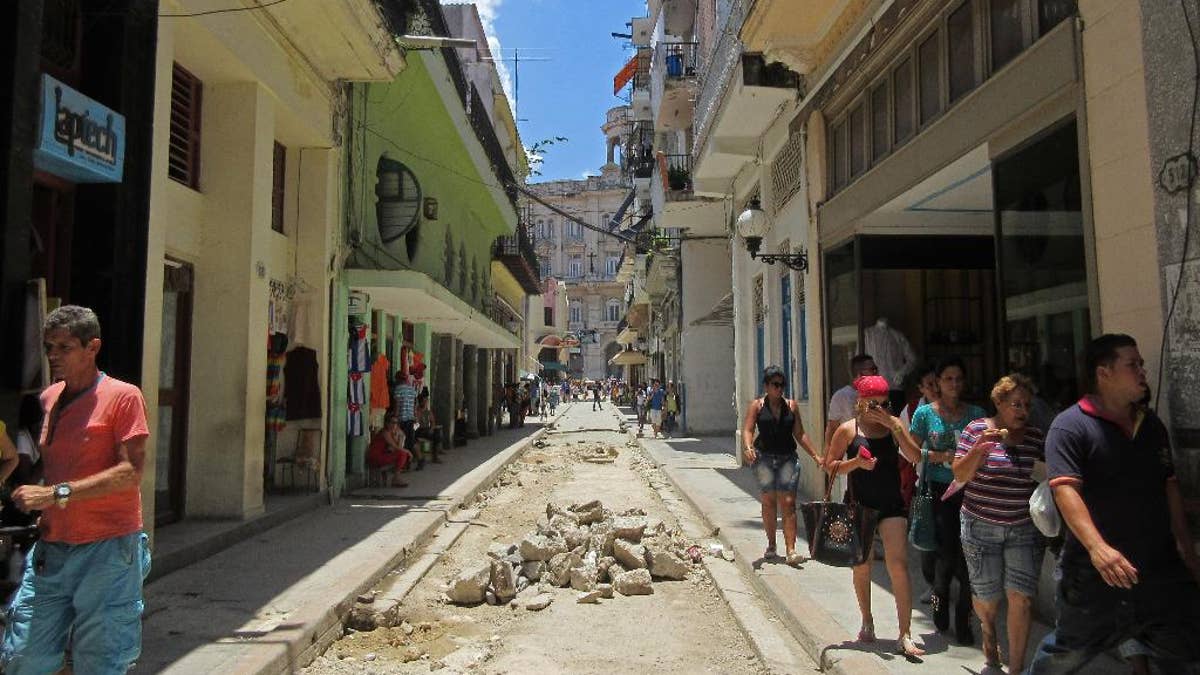
In this May 17, 2015 photo, pedestrians walk on a narrow street in Old Havana, Cuba. It's not unusual to see the sky through a roofless stone facade or piles of rubble in the street. But other sites have been beautifully restored, especially around the squares in the eastern half of the neighborhood bordering the water. (AP Photo/Beth J. Harpaz) (The Associated Press)
Exactly a year ago I travelled to Havana to visit a Cuban friend. I arrived with the usual tourist expectations: Wonderful weather, beautiful people, dazzling American automobiles circa 1955 and, most of all, a society, long dominated by an oppressive communist regime, now opening to the world.
Well, the weather was good.
My friend lived in one of the better residential neighborhoods of Havana. People there mostly receive remittances from relatives abroad, and are mostly wealthier than their fellow citizens, who subsist on government “salaries” of twenty-five dollars a month.
Still, the area wasn’t especially luxe. The streets were poorly lighted and ravaged by potholes. Most of the houses were unpainted and the gardens poorly tended. Tap water was so toxic it had to be boiled even for dishwashing. Electricity was an on and off thing.
What the neighborhood lacked in amenities it made up for in supervision. As soon as we arrived, I was taken down to street for a social call on an elderly couple who spoke no English (very few Cubans do).
The couple didn’t seem particularly happy to see us, and the visit was brief and unsmiling. Later I realized that I had been introduced to the block captains of the Committee for the Defense of the Revolution, snoops deputized by the government to keep an eye out for politically incorrect behavior (which includes association with dubious foreigners).
The next morning we went grocery shopping. Ordinary Cuban bodegas, I learned, offer only a single brand of the most basic commodities. We went to a fancy grocery that carried a selection of the most basic commodities. There were even a few luxury items. My host was happily surprised to find apples on sale. There was no other fruit available in the produce section that day.
With the exception of a few government buildings, central Havana is dismal and decaying. Most of the cool-looking Chevys and DeSotos, on closer inspection, turn out to be decrepit wrecks, some lacking floorboards.
Street life was depressing. I have been places where the people seemed poor but happy. Here they seemed poor, beaten down and resigned.
Maybe I was projecting; if I had to live on twenty five bucks a month, scrounge for apples and get spied on by commissars down the block, I’d be resigned too.
We visited the Museum of the Cuban Revolution, where groups of uniformed school children gazed dutifully at photos of Fidel and Raul and Che and the other founding fathers of the regime.
I was especially interested in a caricature exhibit of American presidents, “Los Cretins” featuring a Ronald Reagan in an oversized cowboy hat and George W. Bush wearing a Nazi insignia. The guard encouraged us to take a photo.
My host, a sophisticated and well-educated person, was, I thought, somewhat embarrassed. But she was disinclined to discuss local politics, and not very well informed about the rest of the world. When I mentioned that two Cuban-Americans, Marco Rubio and Ted Cruz, were then vying for the Republican presidential nomination, she looked at me blankly. “I haven’t seen anything about that on the news,” she said.
She didn’t wonder why. Cuban media, I discovered, is entirely controlled by the Communist Party’s Department of Revolutionary Orientation. So, too, is the internet. My host had no connection at home. When she wanted to communicate with relatives overseas, she went to a government-approved hotel and waited in line. It was understood that the messages would be monitored by government censors.
In the middle of the visit my host came down with a mild infection. I expected I would get a chance to see one of Cuba’s famous free clinics in action. Instead we went to a private pharmacy where she bought an antibiotic under the counter. She explained that nobody who can afford it would dream of going to a government clinic. The doctors and nurses are good, she said protectively, but the clinics rarely have the right medication.
My visit ended, as it began, at the airport, where I bought a box of cigars and a bottle of rum—two of the three quality commodities produced during the reign of Fidel and Raul Castro.
The third was on sale in the airport’s only bookstore which was named, with rare candor, “Propaganda.”
